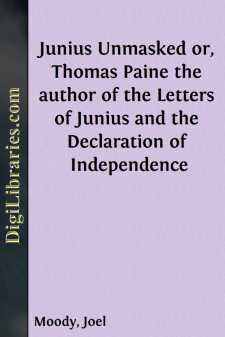Categories
- Antiques & Collectibles 13
- Architecture 36
- Art 48
- Bibles 22
- Biography & Autobiography 813
- Body, Mind & Spirit 142
- Business & Economics 28
- Children's Books 15
- Children's Fiction 12
- Computers 4
- Cooking 94
- Crafts & Hobbies 4
- Drama 346
- Education 46
- Family & Relationships 57
- Fiction 11829
- Games 19
- Gardening 17
- Health & Fitness 34
- History 1377
- House & Home 1
- Humor 147
- Juvenile Fiction 1873
- Juvenile Nonfiction 202
- Language Arts & Disciplines 88
- Law 16
- Literary Collections 686
- Literary Criticism 179
- Mathematics 13
- Medical 41
- Music 40
- Nature 179
- Non-Classifiable 1768
- Performing Arts 7
- Periodicals 1453
- Philosophy 64
- Photography 2
- Poetry 896
- Political Science 203
- Psychology 42
- Reference 154
- Religion 513
- Science 126
- Self-Help 84
- Social Science 81
- Sports & Recreation 34
- Study Aids 3
- Technology & Engineering 59
- Transportation 23
- Travel 463
- True Crime 29
Junius Unmasked or, Thomas Paine the author of the Letters of Junius and the Declaration of Independence
by: Joel Moody
Description:
Excerpt
INTRODUCTION.
The literary work which survives a century has uncommon merit. Time has set the seal of approval upon it. It has passed its probation and entered the ages. A century has just closed upon the work of Junius. The causes which produced it, either in act or person, have long since passed away. The foolish king, the corrupt minister, and the prostituted legislature are forgotten, or only recalled to be despised; but the work of Junius, startling in thought, daring in design, bristling with satire, a consuming fire to those he attacked, remains to be admired for its principles, and to be studied for its beauty and strength.
The times in which Junius wrote were big with events. The Seven Years' War had just closed with shining victories to Prussia and England. Frederic, with an unimpaired nation and a permanent peace, it left with a good heart and much personal glory; but George III., with India and America in his hands, with the plunder of a great conquest to distribute to a greedy and licentious court, it left pious, but simple.
Great wars disturb the masses. They awaken them from the plodding, dull routine of physical labor, and, thrusting great questions of conquest and defense, of justice and honor, before them, agitate them into thought. Conditions change; new ideas take the place of old ones, and a revolution in thought and action follows. But a war of ideas, starting from principles of peace, brings the enslaved again to the sword, and this crisis is termed a revolution.
Junius wrote at the dawn of the age of revolutions. The war of ideas was waged against priestcraft, and skepticism was the result. Voltaire had struck fable from history with the pen of criticism, and a scientific method here dawned upon history. Rousseau's democracy had entered the hearts of the down-trodden in France, and, a wandering exile, he had spread the contagion in England. George Berkeley, the Irish idealist, had just died, and the Scotch Thomas Reid arose with the weapon of common sense to test the metaphysician's ideas. Common Sense was, in the strictest sense, revolutionary, and, under the tyranny of king, lords, and commons, meant war. It was not a phrase without meaning, but a principle proclaimed, and it passed more readily into the understanding of the common people because conveyed in common speech. When Reid said, "I despise philosophy, and renounce its guidance; let my soul dwell in common sense," he illuminated all Britain and America. The philosophy of common sense entered the professor's chair, invaded the pulpit, and, having passed thence into the humblest cottage, soon took a higher range—it went immediately up and knocked at the king's gate. It would be false to say it found admittance there. It was only because there had been a new world opened as an asylum for the oppressed of every land, that it did not sweep kings and monarchs from all the high places in Europe.
At this time, too, Mr. Pitt, the great commoner, the friend of common sense and English liberty, in his old age, war-worn and sick, had compromised with his vanity for a title....


